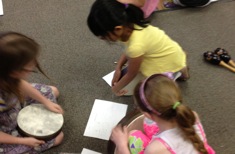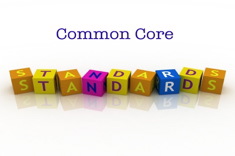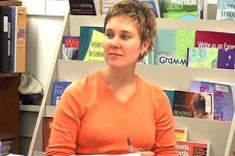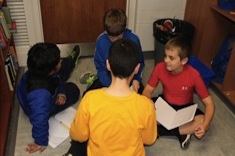Leadership
Do you guide teachers, specialists, and literacy coaches? Here are tools, advice, and strategies school leaders need for their daily work in staff meetings, study groups, and one-on-one discussions with colleagues. If you have a leadership role in coaching teachers and designing professional development, you'll want an upgraded membership with access to our Leaders Lounge.
Latest Content
What’s the Most Beautiful Thing You Know About . . . ?
Ruth Shagoury and Melanie Quinn asked their colleagues to share the “most beautiful thing” about the puzzling student each of them is looking at closely in their study group. This is a great activity if you’re looking for a quick and easy icebreaker to spark some positive energy in your next study group or staff meeting and to remind everyone of the joys of our profession.
Putting the “Gradual” Back into Gradual Release of Responsibility
If it’s not sudden release of responsibility or no release of responsibility, what does gradual look like? Clare Landrigan and Tammy Mulligan bring this model to life.
New Teachers: The Power of Inexperience
Sometimes a lack of experience is a gift worth embracing. Michelle Kelly considers all the strengths new teachers bring to schools, from their comfort with technology to genuine enthusiasm.
Word Nerds
What words are worthy of study? Amanda Adrian and Heather Rader explore that question with colleagues.
Literacy in the Music Room: A Sequence of Lessons
Jennifer Schwanke describes the work of a music teacher who integrates literacy learning into her curriculum.
Family Literacy Night
Family Literacy Nights have become popular in many schools. Principal Jennifer Schwanke describes the format for a successful event, including a sample program and tips.
Hindsight: What I Wish I’d Known Before My School Burned Down
Melanie Quinn shares lessons from the fire that burned down her school.
Thank You For Arguing
In the second installment of our teaching argument/opinion writing series, Heather Rader uses a continuum dialogue and modeled writing with intermediate students.
Bully Literacy
Heather Rader shares texts for building understanding about bullies.
Two Teachers and One Kindergartner
Principal Jennifer Schwanke looks at the challenging issue of retention and the power of teamwork.
I Love a Good Argument
As Heather Rader works with teachers and teams on opinion/argumentative writing, she’s considering the anatomy of an argument and engaging ways to teach it.
Evaluating the Literacy Classroom
Jennifer Schwanke remembers the awkward and stressful experience of being evaluated as a young teacher. In her work now as a principal, she’s developed her own criteria for evaluating teachers.
Staying Child-Centered When You Work with Adults
Andie Cunningham shares challenges and practical strategies for how literacy leaders can stay child-centered.
Peer Conferring: The Modeling Phase
Amanda Adrian provides a framework, sample model lesson, and peer conferring guide for students to use as they learn how to respond to their classmates.
Conferring for Conventions (Conventions Series Part 5)
Heather Rader gives examples of convention conferences in this final installment of the conventions series.
Reading as Reward
Principal Jennifer Schwanke finds herself on a mad dash to buy a baked potato for a struggling reader, and this is the moment that crystallizes for her everything that is wrong with most reading rewards (especially those involving food).
Aligning the Common Core and Conventions Instruction (Conventions Series Part 4)
Heather Rader works with a team of intermediate teachers as they connect their plans for conventions instruction and the Common Core.
Between Inquiry and Instruction (Conventions Series Part 3)
Heather Rader works with a team of intermediate teachers as they pore over student work together and analyze which conventions should be taught.
Make a Really BIG List
Big lists can be intimidating, especially when our to-do lists are long and never quite finished. Ruth Ayres explains the power of big lists in other contexts, especially writing, and how they might actually provide comfort and security when tackling big projects and ideas.
Concise, Conversational, and Consistent: Explaining the Work of Literacy Coaches
Heather Rader shares the language she uses to describe literacy coaching to others.
Trust
Mary Lee Hahn reminds herself (and us!) of the qualities we have that inspire trust in ourselves and our ability to teach well.
Notes from the Mad Teachers Liberation Front: Create Your Manifesto
Start your school year off right (or get it back on track) with a manifesto about who you are and what you value. Ruth Shagoury provides a mentor poem, guidelines and samples.
Introducing the Common Core Standards in Writing (Part 2)
Heather Rader shares more guidelines for a professional development day on the Common Core with a writing focus.
Volunteered: What I Learned from Cleaning Out the Barn
Andie Cunningham is "ticked and disgusted" when her boss volunteers her for yet another committee. Cleaning out the barn clears her head, reminding Andie of all the tools and strategies literacy leaders have for dealing with whatever is flung their way.
Introducing the Writing Common Core Standards: Planning for Professional Development
Heather Rader sorts through goals, audience, and interest in planning a day of professional development linked to the writing standards in the Common Core.
Energy, Stamina, and Training Wheels for Coaching Teachers
Gradual release, not-so-gradual release or catch and release? Heather Sisson ponders the challenges of providing the appropriate support in a coaching cycle.
Discussing Observations with New Teachers
Jennifer Allen’s new teacher group discusses what they learn from classroom observations in this video taped early in the fall.
The ABCs of Literacy Coaching (Part 1)
Heather Rader shares the essential elements of successful literacy coaching in this first installment of a month-long series.
Ask Me – I’m Not the Expert
Heather Sisson explores the complicated links between relationships and expertise for literacy coaches and teachers.
What is the Content for Small-Group Instruction? (Part 2 of the Grouping Series)
Heather Rader considers how assessments and observations might be used to create flexible groups.
Browse Content By
Type
Category
- Assessment Tools
- Big Fresh Archives
- Booklists
- Choice Numeracy
- Classroom Design
- Common Core
- Community Building
- Conferring
- Content Literacy
- Digital Literacy
- English Language Learners
- Equity
- Family Relations
- Free Samples
- Guiding Groups
- Leadership
- Literacy Coaches
- Mentor Texts
- Minilessons
- New Teacher Mentors
- Podcasts
- Poetry
- Quote Collections
- Reading Strategies
- Self Care
- Struggling and Striving Learners
- Talking and Listening
- Teacher Study Groups
- Teaching Reading
- Teaching Writing
- Word Study and Vocabulary
Author
- Melissa Quimby
- Nawal Qarooni
- Gwen Blumberg
- Julie Cox
- The Lead Learners
- Hannah Tills
- Josie Stewart
- Ruth Metcalfe
- Mallory Messenger
- Becca Burk
- Jodie Bailey
- Vivian Chen
- Mary Brower
- Tiffany Abbott Fuller
- Stephanie Affinito
- Ruth Ayres
- Leigh Anne Eck
- Heather Fisher
- Shari Frost
- Julie Johnson
- Suzy Kaback
- Gigi McAllister
- Shirl McPhillips
- Melanie Meehan
- Cathy Mere
- Debbie Miller
- Tara Barnett and Kate Mills
- Tammy Mulligan
- Dana Murphy
- Bitsy Parks
- David Pittman
- Brenda Power
- Heather Rader
- Matt Renwick
- Mandy Robek
- Christy Rush-Levine
- Gretchen Schroeder
- Jen Schwanke
- Brian Sepe
- Katherine Sokolowski
- Stella Villalba
- Jennifer Vincent
Grade Level
Choice Literacy Membership
Articles
Get full access to all Choice Literacy article content
Videos
Get full access to all Choice Literacy video content
Courses
Access Choice Literacy course curriculum and training




























